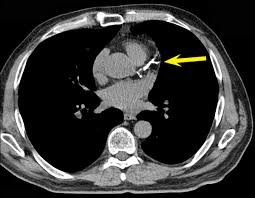July 11, 2015 - The extent of coronary artery calcification (CAC) accurately predicts 15-year mortality in a large cohort of asymptomatic patients, according to a study published in the Annals of Internal Medicine.1
The extent of CAC and near-term adverse clinical outcomes are strongly related through 5 years of follow-up. Researchers conducted a study to describe the ability of CAC scores to predict long-term mortality in persons without symptoms of coronary artery disease.
Coronary artery calcification scoring and binary risk factor data were collected from a single-center, outpatient cardiology laboratory. The primary end point was time to all-cause mortality (median follow-up, 14.6 years). Using univariable and multivariable Cox proportional hazards models to compare survival distributions, the CAC score was highly predictive of all-cause mortality (P < 0.001). Overall 15-year mortality rates ranged from 3% to 28% for CAC scores from 0 to 1000 or greater (P < 0.001). The relative hazard for all-cause mortality ranged from 1.68 for a CAC score of 1 to 10 (P < 0.001) to 6.26 for a score of 1000 or greater (P < 0.001). The categorical net reclassification improvement using cut points of less than 7.5% to 22.5% or greater was 0.21 (95% CI, 0.16 to 0.32).

Source: www.cedars-sinai.edu
Based on their findings, the authors concluded that CAC accurately predicts 15-year mortality in a large cohort of asymptomatic patients. They suggested that long-term estimates of mortality provide a unique opportunity to examine the value of novel biomarkers, such as CAC, in estimating important patient outcomes.
References:
1. Shaw LJ, Giambrone AE, Blaha MJ, et al. Long-Term Prognosis After Coronary Artery Calcification Testing in Asymptomatic Patients: A Cohort Study. Ann Intern Med. 2015;163(1):14-21. doi:10.7326/M14-0612




